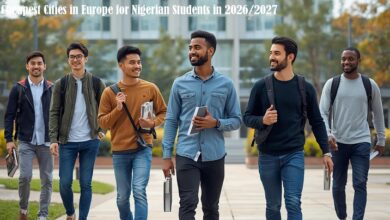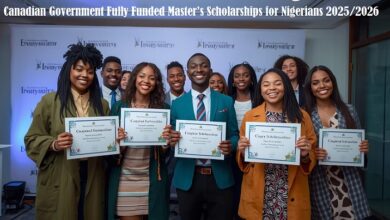Italy Family Reunion Visa Application 2025/2026

Italy Family Reunion Visa Application 2025/2026
Family is central to life. For many Nigerians and other non-EU nationals living and working in Italy, reuniting with loved ones is one of their top priorities. The Italy Family Reunion Visa (also called Nulla Osta per Ricongiungimento Familiare) is the legal pathway that allows foreign residents to bring eligible family members to join them. This guide explains everything about the application process in 2025 – eligibility, required documents, timelines, costs, tips for a successful application, and what to expect after arrival.
What Is the Italy Family Reunion Visa?
The Italy Family Reunion Visa is a long-stay entry permit issued to family members of a non-EU citizen who already has legal residence in Italy. It allows spouses, children, parents and other eligible relatives to travel and live in Italy on the basis of family ties. Once issued, the visa holder can apply for a residence permit (permesso di soggiorno per motivi familiari) and enjoy rights to healthcare, schooling and in some cases work.
Who Can Apply: Eligibility of the Sponsor
The person already living in Italy (the “sponsor”) must meet certain conditions:
-
Legal Residence: You must hold a valid residence permit (e.g. work permit, study permit, long-term EU residence card).
-
Minimum Duration: In most cases you must have at least one year’s residence before applying.
-
Housing Requirements: Adequate accommodation certified by the local municipality.
-
Income Requirements: Proof of sufficient income to support your family member(s). For 2025, the income threshold is usually tied to the annual social allowance (about €6,500 per year for one family member; higher for each additional person).
-
No Criminal Record: Serious violations can disqualify an application.
Italy Family Reunion Visa Application 2025/2026
Eligible Family Members
The law allows you to bring:
-
Your spouse (legally married partner).
-
Minor children under 18 years (including adopted children).
-
Adult dependent children with disabilities.
-
Parents if they are dependent and have no other children able to support them in the home country.
-
In some cases, unmarried partners with stable, proven relationships.
Each category requires specific documentation proving the relationship (marriage certificate, birth certificate, adoption papers, dependency evidence, etc.).
Step-by-Step Application Process in 2025
Step 1: Obtain the Nulla Osta (Clearance)
Before your family member can apply for the visa at an Italian consulate, you must request a clearance called Nulla Osta from the local immigration office (Sportello Unico per l’Immigrazione) in your province of residence. This is done online through the Ministry of Interior portal.
You will upload your residence permit, income proof, housing certificate, and family relationship documents. The office reviews your application and may call you for an interview or to submit originals.
Step 2: Receive the Nulla Osta
If approved, you receive an electronic Nulla Osta (valid for six months). You send it to your family member abroad.
Step 3: Apply for the Visa at the Consulate
Your family member takes the Nulla Osta plus the required documents to the Italian Embassy or Consulate in their country (for Nigerians, the Embassy in Abuja or Consulate in Lagos). They complete the long-stay visa form, attach passport photos, pay the visa fee (about €116), and book an appointment for biometric capture.
Step 4: Wait for Processing
Visa processing times vary but average four to eight weeks. Incomplete files or high demand can extend the wait.
Step 5: Travel to Italy and Apply for a Residence Permit
Once the visa is issued, the family member enters Italy and within eight days must apply for the residence permit at the local post office using the kit permesso di soggiorno. Fingerprints are taken at the police headquarters (Questura). The permit usually has the same validity as the sponsor’s permit and is renewable.
Italy Family Reunion Visa Application 2025/2026
Required Documents
Typical documents include:
-
Valid passport of the applicant (family member).
-
Nulla Osta clearance.
-
Visa application form filled and signed.
-
Two recent passport-size photos.
-
Marriage certificate, birth certificate or other relationship proof, legalized and translated into Italian.
-
Proof of accommodation and income of the sponsor in Italy.
-
Receipt of visa fee payment.
-
Travel insurance covering the initial period in Italy.
All foreign documents must be legalized or apostilled and translated into Italian by an accredited translator.
Costs and Fees
-
Visa application fee: about €116 per applicant.
-
Residence permit fee in Italy: ranges from €76 to €100 depending on the length.
-
Costs for translation, legalization, courier services, and medical insurance vary.
While there is no official “salary” connected to the visa, applicants should budget for travel, documentation, and settlement expenses. The sponsor must prove income above the legal threshold; for a family of three or more, this can exceed €10,000 per year.
Processing Times
-
Nulla Osta issuance: 30–90 days.
-
Visa issuance: 4–8 weeks.
-
Residence permit: card delivered within a few months after fingerprinting.
Starting early is crucial, especially if you want your family with you before school terms or work seasons begin.
Rights and Benefits of the Family Reunion Visa
-
Legal Stay: Live lawfully in Italy with your family.
-
Healthcare and Schooling: Access to the national health system and free public education for children.
-
Work Rights: In many cases, adult family members may work in Italy without an additional work permit.
-
Pathway to Long-Term Residency: Time spent on a family permit counts toward the five-year requirement for an EU long-term residence card.
Common Mistakes to Avoid
-
Submitting incomplete or expired documents.
-
Failing to translate and legalize certificates properly.
-
Underestimating the income requirement.
-
Waiting too long to apply after receiving the Nulla Osta.
Italy Family Reunion Visa Application 2025/2026
Tips for a Successful Application
-
Keep copies of everything you submit.
-
Prepare financial and housing evidence before starting.
-
If your documents are from Nigeria, use recognized translators and legalize at the Ministry of Foreign Affairs.
-
Book consulate appointments early – slots fill quickly.
-
Track your application through the consulate or courier service.
Life After Arrival – What Families Should Expect
Once reunited in Italy, families often go through an adaptation period. Children may enroll in Italian schools and learn the language; spouses may start job searches or Italian language courses. Local municipalities sometimes provide integration classes. Having proper documents from the start makes access to public services smoother.
Testimonies from Applicants
Although official testimonies are not publicly listed, many immigrants report that careful preparation helped them succeed. For example, a Nigerian worker in Milan explained that by ensuring his housing contract and payslips were ready before applying for the Nulla Osta, he avoided delays. Another family in Naples noted that translating documents early saved them months of waiting.
Future Prospects
Italy continues to refine its immigration policies. In 2025 the government plans digital upgrades to the Nulla Osta system, reducing paperwork and waiting times. This could make family reunion procedures more efficient for Nigerians and other applicants.
Summary Table – Key Points
| Step | Action | Who Does It | Timeframe |
|---|---|---|---|
| 1 | Request Nulla Osta | Sponsor in Italy | 30–90 days |
| 2 | Visa Application | Family member at Consulate | 4–8 weeks |
| 3 | Travel & Apply for Residence Permit | Family member in Italy | Within 8 days after arrival |
| 4 | Receive Residence Permit Card | Family member | A few months |
Conclusion
The Italy Family Reunion Visa remains one of the most important immigration channels for non-EU residents who wish to be with their loved ones. By understanding eligibility, gathering documents early, meeting income and housing requirements, and following each step carefully, Nigerians and other foreign nationals can significantly increase their chances of a smooth and successful process in 2025. Reuniting with family not only strengthens personal well-being but also helps integration into Italian society.



